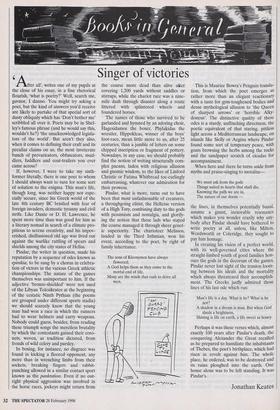Singer of victories
If, however, I were to take my sixth- former literally, there is one poet to whom I should always want to turn for some sort of solution to the enigma. This man's life, though long, was neither happy nor espe- cially secure, since his Greek world of the late 4th century BC bristled with fear of foreign invaders, domestic tyranny and civil strife. Like Dante or D. H. Lawrence, he spent more time than was good for him as a literary nomad in search of a climate pro- pitious to serene creativity, and his impov- erished, disillusioned old age was lived out against the warlike rattling of spears and shields among the city states of Hellas.
Pindar, the writer in question, made his reputation by a sequence of odes known as epinikia, to be sung by a chorus in celebra- tion of victors in the various Greek athletic championships. The nature of the games themselves was unimportant to him. If the adjective 'bronze-shielded' were not used of the Libyan Telesikrates at the beginning of the ecstatic Ninth Pythian (the poems are grouped under different sports stadia) we should scarcely know that the young man had won a race in which the runners had to wear helmets and carry weapons. Nobody could guess, besides, from reading these triumph songs the merciless brutality by which the contestants gained their coro- nets, woven, as tradition dictated, from fronds of wild celery and parsley.
In boxing, for instance, no disgrace was found in kicking a floored opponent, any more than in wrenching limbs from their sockets, breaking fingers and rabbit- punching allowed in a similar contact sport known as the pankration. Even if no out- right physical aggression was involved in the horse races, jockeys might return from the course more dead than alive after covering 1,200 yards without saddles or stirrups, while the chariot race was a nine- mile dash through disaster along a route littered with splintered wheels and foundered horses.
The names of those who survived to be garlanded and hymned by an adoring choir, Hagesidamos the boxer, Phylakidas the wrestler, Hippokleas, winner of the boys' foot-race, mean little more to us, after 25 centuries, than a jumble of letters on some chipped inscription or fragment of pottery. Nowadays, in any case, we should probably find the notion of writing structurally com- plex paeans, laden with religious allusion and gnomic wisdom, to the likes of Linford Christie or Fatima Whitbread toe-curlingly embarrassing, whatever our admiration for their prowess.
Pindar, what is more, turns out to have been that most unfashionable of creatures, a throughgoing elitist, the Hellenic version of a High Tory, combining duty to the gods with pessimism and nostalgia, and glorify- ing the notion that these lads who stayed the course managed it through sheer genet- ic superiority. The charioteer Melissos, lauded in the Third Isthmian, won his event, according to the poet, by right of family inheritance.
The sons of Kleonymos have always flowered; A God helps them as they come to the mortal end of life.
Many are the winds that rush to drive all men.
This is Maurice Bowra's Penguin transla- tion, from which the poet emerges as rather more than an elegant reactionary with a taste for gym-toughened bodies and dense mythological allusion to 'the Queen of sharpest arrows' or 'horrible Alky- doneus'. The distinctive quality of these odes is a sturdy, unflinching directness, the poetic equivalent of that staring, pitiless light across a Mediterranean landscape, on islands like Sicily or Aegina where Pindar found some sort of temporary peace, with goats browsing the herbs among the rocks and the sandpaper scratch of cicadas for accompaniment.
When here and there he turns aside from myths and praise-singing to moralise—
We must ask from the gods Things suited to hearts that shall die, Knowing the path we are in, The nature of our doom —
the lines, in themselves potentially banal, assume a gaunt, inexorable resonance which makes you wonder crazily why any- body after Pindar should have bothered to write poetry at all, unless, like Milton, Wordsworth or Coleridge, they sought to pay him homage.
In creating his vision of a perfect world, with its well-governed cities where the straight-limbed youth of good families hon- ours the gods in the decorum of the games, Pindar never lost sight of the tension loom- ing between his ideals and the mortality which always threatened their accomplish- ment. The Greeks justly admired those lines of his last ode which run:
Man's life is a day. What is he? What is he not?
A shadow in a dream is man. But when God sheds a brightness, Shining is life on earth, a life sweet as honey.
Perhaps it was these verses which, almost exactly 100 years after Pindar's death, the conquering Alexander the Great recalled as he prepared to humiliate the inhabitants of Thebes, the poet's birthplace, which had risen' in revolt against him. The whole place, he ordered, was to be destroyed and its ruins ploughed into the earth. One house alone was to be left standing. It was Pindar's.
Jonathan Keates


























































 Previous page
Previous page